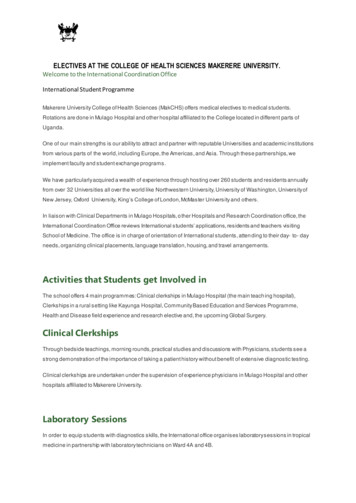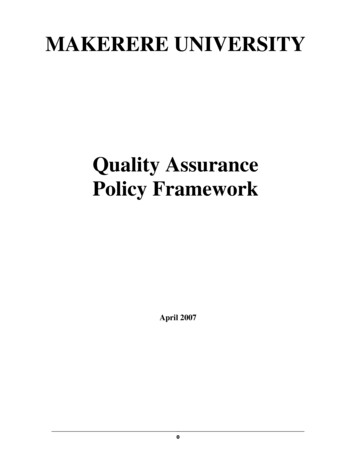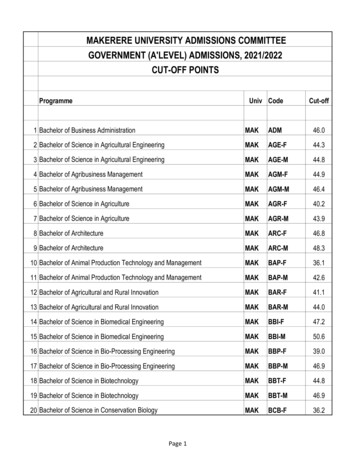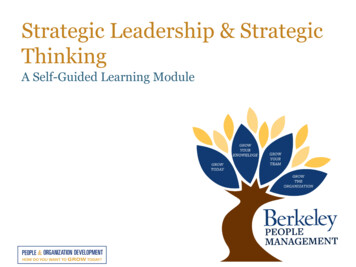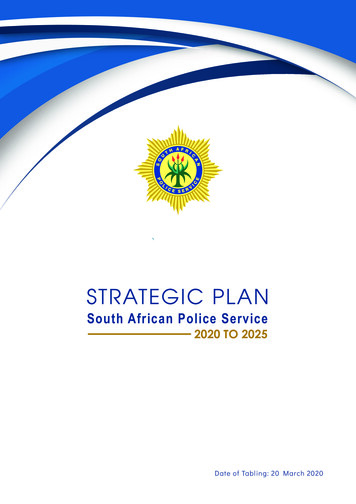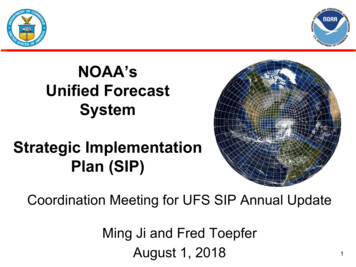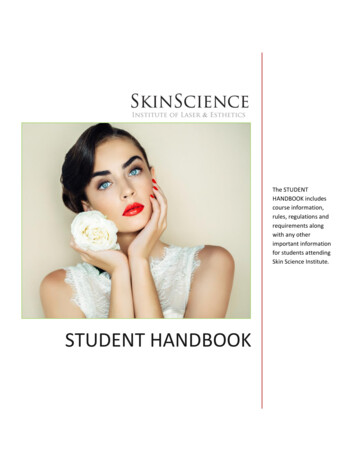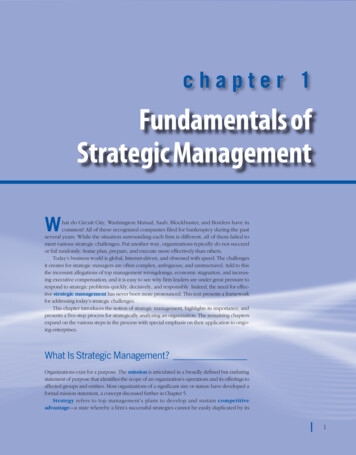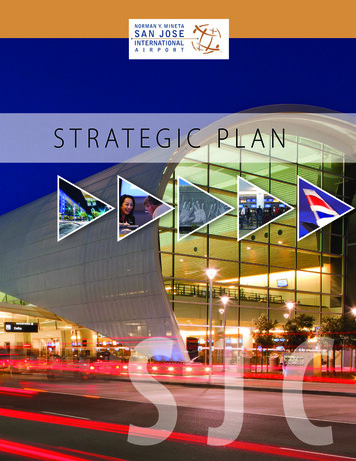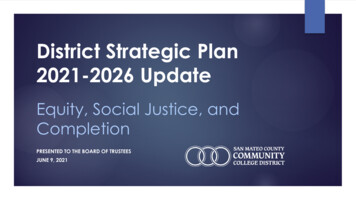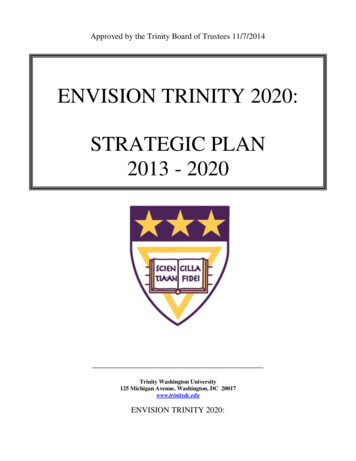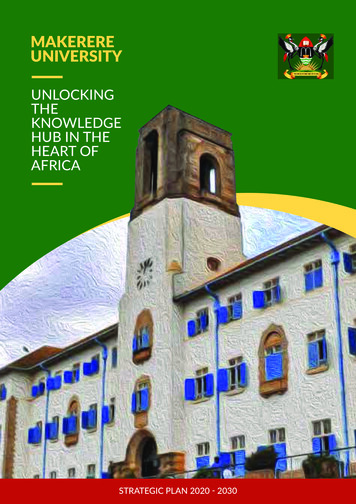
Transcription
MAKEREREUNIVERSITYUNLOCKINGTHEKNOWLEDGEHUB IN THEHEART OFAFRICAUNLOCKING THE KNOWLEDGE HUB IN THE HEART OF AFRICASTRATEGIC PLAN 2020 - 20301
The previous ten-year Strategic Plan (2007/82017/18, extended to 2019/20) sought to makeMakerere a centre of excellence in teaching andlearning, research and innovation in Africa.This new Strategic Plan (2020/21-2030/31 seeksto consolidate Makerere’s position as the globalknowledge hub at the heart of Africa.The Strategic Plan is developed by the UniversityCouncil with the participation of all key stakeholders,including members of staff, students, developmentpartners and Government.2
CONTENT04 10 23VISION STATEMENT,MISSION AND COREVALUES 2020-2030STRATEGIC PLANNINGFRAMEWORK2020 - 2030A RECAP OF THESTRATEGIC PLAN2007-2019UNLOCKING THE KNOWLEDGE HUB IN THE HEART OF AFRICA3
VISIONSTATEMENT,MISSION ANDCORE VALUES2020-20304
VISION 2030Makerere University is a thought leaderof knowledge generation for societaltransformation and developmentMISSION OFMAKERERE UNIVERSITYMakerere University is committed to providingtransformative and innovative teaching,learning, research and services responsive todynamic national and global needs.CHAIRPERSON’S MESSAGEThe Strategic Plan 2020-2030lays the foundation for theeffective implementation ofthe vision and mission of theUniversity. It articulates thepriorities and objectives whiletaking into consideration thefast- changing environmentglobally, in the provision ofhigher education.Over the next ten years, theUniversity seeks to continueoptimizing her potential as aknowledge hub and focusingits research and innovation toaddressing the complex issuesin the nation, region, and inAfrica.Makerere University Council iscommitted to ensuringan enabling policy environmentfor the implementation of thisStrategic Plan.Mrs. Lorna Magara, Chairpersonof Council (2018-2022)UNLOCKING THE KNOWLEDGE HUB IN THE HEART OF AFRICA5
MAKERERE’SCORE grityRespect6
We commit ourselves tothe following core values:Professionalisma)Adoption of work ethics that demonstratecompetence and capacity to generateresults to the expected institutional,national, international and disciplinespecific standardsb)A culture of customer care that promotesMakerere as a responsible publicinstitution.Accountabilitya)Upholding ethos that meet theexpectations of the different stakeholders;b)Providing accurate information to all ourstakeholders in a transparent manner,including:i. Information to prospective studentsabout the programmes offered bythe university, the duration of theprogrammes and the fees charged;a)Uphold ethical values that will ensure thatwe do the right thing in all circumstancesb)Maintaining the value of honesty, trustand responsibility in all our actions.ii. Information to continuing students andstaff about the learning environmentand opportunities for improving it;Respectiii. Information to Government, parentsand development partners on themobilization and utilization of financialresources;a)Staff and students will conduct themselveswith due regard and consideration for therights of others;b)Ensure acknowledgement, attention andgood judgement in dealings with all ourstakeholders.iv. Information to staff on the workingenvironment and opportunities forimprovement.c)IntegrityReports on assessment of our learningoutcomes, including employability of ourgraduates.InclusivityMakerere will be an equal opportunityinstitution that embraces diversity in orderto achieve maximum potential withoutdiscrimination.This Strategic Plan is aimed attransforming the University intoa “research-led” institution witha multi-faceted research agenda;enhanced engagement withindustry and business sector.Professor BarnabasNawangwe Vice ChancellorIn the context of changingglobal trends and increasingcompetition in higher education,we considered it a priority tofurther strengthen our academicdevelopment and research aswell as student development.Part of this initiative includesleveraging our wealth ofexperience in liberal artseducation and our researchexcellence to collaborate witheminent universities, offer moredistinct degree programmes,provide research opportunitiesfor outstanding students acrossthe world, and elevate ourreputation in the internationalarena.UNLOCKING THE KNOWLEDGE HUB IN THE HEART OF AFRICA7
OPTIMISINGTHE POTENTIAL OFMAKERERE UNIVERSITYAS THE KNOWLEDGE HUBSTRATEGICPLANNINGFRAMEWORK2020 - 20308
The Makerere University Strategic Plan2020-2030 has been formulated withinan environment that is characterized byglobalization, climate change, high unemployment and the emergence of newcommunicable and non-communicable diseases.The Strategic Plan is hinged in Uganda’saspiration of attaining middle income status bythe year 2040 (Vision 2040). The Strategic Planis also cognizant of Africa’s development agendaenshrined in Agenda 2063. Makerere Universityhence aspires to contribute to the achievementof the above aspirations. In order to ensureMakerere’s effective contribution, the StrategicPlan is designed around four over-arching goals.The four goals are:A RESEARCH - LED UNIVERSIYTYRESPONDING TO NATIONAL,REGIONAL AND GLOBALDEVELOPMENT CHALLENGESAN ENGAGED UNIVERSITY WITHENHANCED PARTNERSHIPS WITHINDUSTRY, THE COMMUNITY ANDINTERNATIONAL INSTITUTIONSINNOVATION IN TEACHINGAND LEARNING THATRESPOND TO THECHANGING ENVIRONMENTA PROFESSIONALLYGOVERNED, EQUITABLE,INCLUSIVE AND GENDERMAINSTREAMED INSTITUTIONPresident Yoweri Museveni inspecting innovations by students from the College ofAgricultural and Environmental Sciences during the College’s Open DayUNLOCKING THE KNOWLEDGE HUB IN THE HEART OF AFRICA9
GOAL 1A RESEARCH-LEDUNIVERSITYTo transform Makerere into a research-leduniversity, responding to national, regionaland global development challenges, as wellcontributing to global knowledge generation.10
To accomplish this goal, Makerere Universitywill leverage existing capacities to integrateknowledge generated through research, intoteaching, learning, community engagement andthe world of work in order to maximize impact.It is envisaged that the University will shift fromexclusively focusing on creating an enablingenvironment (financing, research & innovationsinfrastructure) to a position of defining, creating,nurturing and investing in the building blocksfor a research-led University in Uganda. Therewill be a distinct shift to increased graduateenrolment and knowledge production. Therewill be efforts to engage government to fundgraduate programmes through the Student LoanScheme and other direct funding mechanisms.The University will leverage its premier positionto create a critical mass of graduate enrolmentto act as a base for knowledge generationand transfer. An environment that providesopportunities for students and staff to engagewith the relevant stakeholders as part oftheir research will be created. Through theestablishment of Research Chairs, emphasis willmove towards large-scale, multi- disciplinary,multi institution research activities that willpromote generation and utilisation of researchresults for sustainable national development.A research and innovations ecosystem willbe created to ensure that University researchwill collectively over the next 10 years havedemonstrable economic, environmental, healthand social impacts. The University will:a)b)Create think tank(s) and gradually movetowards increased engagement withindustry, business and other researchusers.Develop a framework for packagingand marketing research outputs forappropriate adoption and adaptation.The profile of indigenous research willbe increased, knowledge technologytransfer promoted and IntellectualProperty commercialised. Knowledge andTechnologyTransfer Partnerships will act as thevehicle through which ideas generatedfrom basic and applied research will makemeaningful contribution to development.c)Through new products and technologies,the University will positively influencepolicy and address emerging societyneeds. World class research metrics willbe used to evaluate scholarly activities,creative work, intellectual property andother research products.The objectives for thisgoal are:i.To enhance knowledge generation, accessand innovations for basic and appliedresearchii.To enhance capacity for graduate trainingand researchiii.To Maximise translation of research intoproducts and processes that impactcommunitiesestablish an environmentthat supports and motivates staff andstudents to engage in interdisciplinarycollaboration, and support or establishnew interdisciplinary research institutesiv.To provide support to researchers toattract funding from international sourcesv.To Encourage establishment of think tanksto tap into the expertise of experiencedresearchersvi.To encourage innovation, translationalresearch and research uptakevii.To encourage inquiry into Africanproblems by leveraging African indigenousknowledgeInnovations like the Kayoola Electric bus above will be encouragedUNLOCKING THE KNOWLEDGE HUB IN THE HEART OF AFRICA11
GOAL 2INNOVATIONSIN TEACHINGAND LEARNINGIn her quest to provide the desired human capital,the University is committed to creating theappropriate environment and support to studentsto meet their academic and professional aspirations.Teaching and learning will be all-inclusiveintegrating gender and special needs requirements.12
Student centred Teaching andLearningThe University is to consolidate offering oflearner-centred academic programmes which areresponsive to student needs and expectations,with flexible study options, support and adviceavailable to all students. To achieve this goal, thefollowing will be done:a)The curriculum will be learner centred;promote participation, experimentationand collaborative learning.b)A problem/community-oriented andcompetence-based learning approach thatprepares the learner to take on societalchallenges will be adopted.c)The role of the academic staff is envisagedto change from lecturing to designing oflearning experiences and environments inwhich students learn and work togetherwith the lecturer becoming more ofa coach. This will promote the criticalintellectual dispositions and build capacityfor independent thinking and analysisof unchartered and complex issues. Theoutput will be a versatile graduate that isopen to lifelong learning.d)The University will mainstream Open,Distance and e-Learning (ODeL)to enhance access and address theincreasing demand for higher education.The adoption of ODeL and/or blendedlearning strategies will further act asthe foundation for the development of21st Century skills demanded by themarketplace.Support Services for A HolisticStudent ExperienceInitiatives will be geared towards creating aconducive environment to enhance efficientand effective teaching, learning, research andoutreach functions. Creating the appropriatesupport environment for students to meettheir academic and professional aspirationswill translate into positive attitudes as well asgenerate affinity and loyalty to the institution.a)The University will provide studentsupport services that ensure holisticdevelopment of the student withtransferable skills to succeed in a globalworkplace.b)The plan will enhance student advisoryand support services, with the aim toprovide a greater range of activitiesincluding career guidance, counselling andmentorship.c)In addition, the University will engagestudents through the student employmentscheme to augment the human resourcein the various functional areas (Library,Academic Registrar, DICTS & Halls ofresidence).d)Recreational facilities and on-campushalls of residence will be renovated andmodernised.e)Hostels accommodating MakerereUniversity students will be required toobserve minimum hygiene and otherstandards and this will be enforcedthrough hostel affiliation. Hew hostels willbe built to accommodate graduate andfemale undergraduate students as well asstudents with disability.The objectives for this goal are:i.To increase access opportunities to meetincreasing demand for higher educationii.To produce competent graduates withknowledge and skills that harnesstechnology breakthroughs to meetdynamic labour market needsiii.To provide a teaching and learningenvironment that ensures a productiveexperience to both the learners and staffiv.To enhance the academic, professionaland social development of studentsv.To create a conducive environment forstudent academic and social lifevi.To instil commitment in students as local,national and global citizensUNLOCKING THE KNOWLEDGE HUB IN THE HEART OF AFRICA13
14
Students in a computer laboratoryStudents in a bio-chemistry laboratoryStudents of Performing Arts during a lessonDemonstration of agricultural technologyHappy graduands celebrating their success at a graduation ceremony.UNLOCKING THE KNOWLEDGE HUB IN THE HEART OF AFRICA15
GOAL 3A PROFESSIONALLYMANAGED, EQUITABLE,INCLUSIVE AND GENDERMAINSTREAMEDINSTITUTION16
Makerere University will be an equalopportunity and gender responsive institutionwith institutional cohesion- networkingand transparency with clear OrganisationalDevelopment processes. There will be prudentfinancial management, cost-effective andefficient student and staff support services.The objectives under this goal are:i.To strengthen institutional processes thatpromote Makerere University as a goodbrandii.To optimise information technology as aplatform for effective delivery of servicesiii.To ensure the compliance of theUniversity to set standards (National andInternational)iv.To create an affirming and inclusiveteaching, learning and researchenvironment for gender and sexualdiversitiesv.To identify and address institutionalpolicies and practices that reproducepower relations based on any form ofdiscriminationvi.To adopt a zero-tolerance approach to anyform of unfair discrimination, harassment,sexual violence, and behaviour thatdemeans othersvii.To review the composition of allinstitution-wide, college, school anddepartmental committees to ensurerepresentation along gender lines and forother marginalised identitiesviii.To review the mechanisms for enabling andempowering student participation in thegovernance of the universityPresident Yoweri Museveni and the Minister of Education and Sports, Mrs Janet Museveni being receivedby Hon. Chrisostom Muyingo, Minister of State for Higher Education, Professor Ezra Suruma, Chancellor ofthe University, Mrs. Lorna Magara, Chairperson of Council, Hon. Fred Kidega, Vice Chairperson of Counciland Prof. Barnabas Nawangwe, Vice Chancellor at the 69th graduation ceremony of Makerere University.UNLOCKING THE KNOWLEDGE HUB IN THE HEART OF AFRICA17
GOAL 4AN ENGAGED UNIVERSITYWITH ENHANCEDPARTNERSHIPSWITH INDUSTRY, THECOMMUNITY ANDINTERNATIONALINSTITUTIONS18
The fourth industrial revolution economy isdriving partnerships and research investments.The education and research agenda will bedriven by the potential of the university toharness and diffuse emerging technologybreakthroughs in fields such as roboticsand artificial intelligence, big data, quantumcomputing and the Internet of Things, aswell as Nano and biotechnology. These donot only skew the job market towards hightech industries, but they significantly disruptexisting industry value chains and herald newways of serving existing needs. The fourthindustrial revolution presents challenges andopportunities that will impact the job market,businesses, governments and how peopleinteract. The antecedents of this blurring oflines across the disciplines that is driven bydigitisation, impacts on institutional processes,plans as well as the need to produce a versatileand robust graduate that will effectively harnessnew local and global opportunities as theyemerge. To achieve objectives under this goal,Makerere University will:a)enhance partnerships with industryin order to leverage the experience ofindustry;b)prioritise the needs of the community inwhich she is located;Enhance community outreachprogrammes and revitalise Universityopen days.;c)Increase and strengthen her collaborationwith universities and other researchinstitutions regionally and globally.Students from the Norwegian University College of dance performing togetherwith Makerere University students in the Main Hall of Makerere UniversityThe objectives under this goal are:i.ii.To enhance collaboration withGovernment agencies in order to increaseparticipation of Makerere Universityresearchers in policy development andformulation;To increase Makerere Universityinvolvement in Government programmes,particularly programmes that seek toaddress challenges of quality of education,youth un-employment, climate change andfood security, peace, security and conflictresolution and emerging diseases;iii.To encourage formation of joint thinktanks by Government agencies andMakerere University researchers;iv.To increase collaboration with industry inorder to enrich the University’s curriculawith practical knowledge;v.To increase competitiveness of industrylocally and internationally throughresearch on product quality andprocesses;vi.To increase the Makerere University’svisibility globally through joint training andcollaborative research.UNLOCKING THE KNOWLEDGE HUB IN THE HEART OF AFRICA19
L-R: Principal CoCIS-Prof. Tonny Oyana (front); Huawei Uganda MD-Mr. Liu Jiawei (behind Prof. Oyana); Ministerfor ICT and National Guidance-Hon. Frank Tumwebaze (Centre) ; Deputy Chief of Mission of the Chinese Embassyin Uganda- Mr. Chen Huixin; Permanent Secretary, Ministry of Education and sports-Mr. Alex Kakooza and the ViceChancellor, Prof. Barnabas Nawangwe at the launch of Huawei ICT Academy on 14th May 2019 at Makerere University.The EnablingEnvironment for theStrategic Planningframework 2020-2030The success of Makerere University’s StrategicPlanning Framework will not be possiblewithout the requisite enabling environment.Council will put in place policies, proceduresand infrastructure to create the enablingenvironment. The key components of theenabling environment will include:a)The Policy Framework,b)Human Resource,c)Financial Sustainability andd)Infrastructure Support.20Policy FrameworkAll the University’s existing policies will bereviewed and new ones will be enacted toensure a supportive policy environment for theoperationalisation of the Strategic Plan. Policieswill be aligned to the Strategic Plan to addressGovernance, Academic Processes, Researchand innovation including Intellectual PropertyRights (IPR), Infrastructure development andmaintenance, Human resource Management andothers.Human ResourceHuman resource is the foundation of theUniversity’s success. The role of humanresource is continually evolving and we intendto have a more impactful long-term focus ontalent, process, people and organisationaldevelopment. In realizing its mission, theUniversity is committed to integrated andinnovative people-centered services that foster
attraction, retention and development of anengaged, rewarded, motivated, healthy andeffective workforce supporting the strategicdirection of the University.The objectives under HumanResource Development will include:i.To attract, recruit and retain qualityHuman Resource to support the missionof the University;ii.To create an enabling environment foroptimal performance of staff in servicedelivery;iii.To increase the capacity of teachingstaff to deliver using modern pedagogy,including use of Online, Distance ande-Learning (ODEL) technologies.Financial SustainabilityIn an increasingly competitive and globalisedhigher education environment, the Universitymust put in place strategies to ensure efficientand effective management of resources whilegrowing and diversifying her income streams.The University will also integrate its supportstructures to ensure that its excellent teachingand research are complemented by qualityprofessional services. Adequate resourceshave to be mobilised by growing the incomederived from our operations, philanthropy andthe University land holdings. The Universitywill look for more partners to share costsand opportunities for growth, while aligningresources to priorities.We will ensure that the university operateswithin sound financial practices; explores anddevelops new revenue streams and sources ofincome, including donor funding, investmentson the University’s lands, lobbying our alumniand contract research and consultancies. Wewill work towards reducing the University’sdependence on the Government funding by atleast 30%. We will develop new business modelsfor future financial sustainability.Infrastructure SupportIn line with the principles of access and equity,the University will develop the physical, libraryand Information Communication Technologyinfrastructure to create an environmentcommensurate with 21st century qualityuniversity education in a sustainable manner.Deliberate effort will be made to develop andsustain a dynamic work environment that fostersa culture of excellence and innovativenessfor both staff and students. The universitycampus will be made an open wifi area to enablestudents and staff access the internet anywhereon campus.Increased access for female students andincreased enrolment of graduate students willbe achieved through construction of studentaccommodation specifically for this categoryof students. All the University’s buildings willbe modified to enable use by students withdisability.Artistic impressions of the proposed Student Resourcestudent hostelsTeaching HospitalUNLOCKING THE KNOWLEDGE HUB IN THE HEART OF AFRICA21
Monitoring, Evaluation and ReportingAn Implementation Plan has been developed and it identifies the key performance indicators (KPIs)and the main implementation strategies for each area of the Strategic Plan. In order to monitor ourprogress in implementing this Plan, our performance will be measured and reported upon in these keyareas:a)University-level key performance indicators and targets outlined in the implementation plan.These will be through the annual work plans and performance reportsb)Tailored annual performance indicators at Colleges/Administrative units’ levelc)Three-year cycle performance reviews with focus on realignment to emerging issues bothinternally and externally.d)External benchmarks of performance drawn from national and international data sets.e)Benchmarking performance of areas of strategic investment in the area of higher education.This Strategic Planwas approved onSigned:Mrs. Lorna MagaraChairperson, Makerere University CouncilWE BUILD FOR THE FUTURE!22
Appendix: A Recap of the Strategic Plan 2007-2019Executive SummaryGOALNO.GOALOBJECTIVESACHIEVEMENTSTo provide flexible teachingand learning programmes thatmeet national and internationalstandards by the end of 2013All University programmeswere reviewed to meetinternational standardsTo decentralise programmedelivery to established satellitecentres/branch campuses bothonshore and offshore by the end of2013Two campuses wereestablished at Jinja andFort Portal, but the campusin Fort Portal was closedowing to lack of studentsTo increase the proportion ofgraduate students to 20% of totalenrolment by the end of 2015This was not achieved owingto the need to increase thenumber of undergraduatestudents to fund the budgetTo review and update all academicprogrammes to ensure relevanceand the elimination of duplicationby the end of 2010All programmes werereviewed and harmonisedtwice during the StrategicPlan periodTo continually improve the qualityof instructional materials requiredfor the delivery of all academicprogrammesUse of different types oftechnology was introducedin at least 6 CollegesTo provide an environment thatis conducive to learner-centredpedagogy and androgogy in at leastfive academic units by 2018Staff in 8 Colleges weretrained in learner-centredpedagogyTEACHING AND LEARNING12To enhanceaccess toopportunitiesand meet thehigh educationrequirementsat national andinternationallevelsTo improvethe relevanceand quality ofteaching andlearningUNLOCKING THE KNOWLEDGE HUB IN THE HEART OF AFRICA23
GOALNO.GOALOBJECTIVESACHIEVEMENTSRESEARCH AND INNOVATIONS1To consolidateand enhance theresearch profileof MakerereUniversityTo provide a robust supportiveenvironment for a research-drivenUniversity by the end of 2016A central internet backbonewas installed on the maincampus and at branchcampuses. The library wasexpanded and the numberof volumes increasedfrom 150,000 to 200,000.Laboratories in five collegeswere renovated andupgradedPARTNERSHIPS AND NETWORKING1To createan enablingenvironment forpublic and privatesector interfacein the promotionof education ina competitivesettingTo increase public and privatesector participation in Universityactivities by the end of 2010Seven out of 10 Collegeshave active interface withthe public and the privatesectorTo promote increased jointresearch, technology innovationand transfer initiatives to addressstakeholder needs by the end of2011Joint research andinnovation took root in mostColleges. A joint researchculture was institutedTo secure and sustain competitiveterms of service by the end of2012Salaries were more thandoubled by the targetperiodTo develop high-level humanresource performance standardsby the end of 2010Appraisal tools weredeveloped and usedTo develop and maintain a highlevel support system by the end of2011Staff developmentprogrammes, includingsabbaticals, were institutedTo reduce academic staffstudent ratio on the non-distanceeducation delivery mode from thecurrent 1:25 to 1:15 by the end of2016The academic staff-studentratio was decreased to 1:18,which is within acceptablelevels internationallyHUMAN RESOURCE124To ensureMakerereUniversity’scompetitivenessin the recruitmentand retentionof high-qualityhuman resource
GOALNO.GOALOBJECTIVESACHIEVEMENTSORGANISATION AND MANAGEMENT1To ensure thatan efficientand effectiveorganisationaland managementenvironment is inplaceTo ensure that the organisationaland management structures matchthe demands of the University bythe end of 2012The collegiate system wasadopted in 2010To improve the corporate image ofthe University (re-branding) by theend of 2012Re-branding of theUniversity is a continuousprocessTo advocate for the enactmentand effective implementationof gender-responsive policiesand programmes in MakerereUniversity by the end of 2012The Gender MainstreamingPolicy and the GenderMainstreaming Departmentwere institutedTo improve the effectiveness ofthe University panning system bythe end of 2009The Directorate ofPlanning and Developmentwas strengthened, butlater downgraded to adepartmentTo provide a framework forevidence-based decision-makingby the end of 2009This is yet to beimplementedPHYSICAL INFRASTRUCTURE AND PLANNING1To improveMakerereUniversity’sinfrastructureand physicalenvironmentto support herfunctions andservicesTo increase lecture space by20,000 square metres by the endof 2018Lecture space was increasedby 40,000 square metresTo preserve and ensure culturaland historical monuments andartefacts (their integrity, landscapevalues, culture and history) by theend of 2011Some work was done onthis objective, but moreneeds to be doneTo enhance the reorganisation andefficient running and managementof laboratory facilities in MakerereUniversity by the end of 2011The policy on laboratoryuse and maintenance as notbeen enactedTo improve efficiency andeffectiveness in the managementof physical resources suchas classrooms, laboratories,equipment, estate etc. by the endof 2012An assets register wasmade. Maintenance planswere developed, butlack of funds hinderedimplementationUNLOCKING THE KNOWLEDGE HUB IN THE HEART OF AFRICA25
The following charts summarise theachievements of the Strategic Plan 2007-2019Makerere Enrolment GrowthFinancing of the University26
Gender Catch up at Graduation 2008 - 2018International Students (Over 34 6International 168CountryTotalCountryTotal33922 h Sudan 83China1Romania11East Egypt1Nigeria12Sweden1Benin1Ethiopia2Number of publicationsUNLOCKING THE KNOWLEDGE HUB IN THE HEART OF AFRICA27
Makerere UniversityTel: 0414-542803P.O. Box 7062Kampala, Ugandawww.mak.ac.ug28
VISION 2030 MAKERERE UNIVERSITY Makerere University is committed to providing transformative and innovative teaching, learning, research and services responsive to dynamic national and global needs. Makerere University is a thought leader of knowledge generation for societal transformation and development The Strategic Plan 2020-2030
